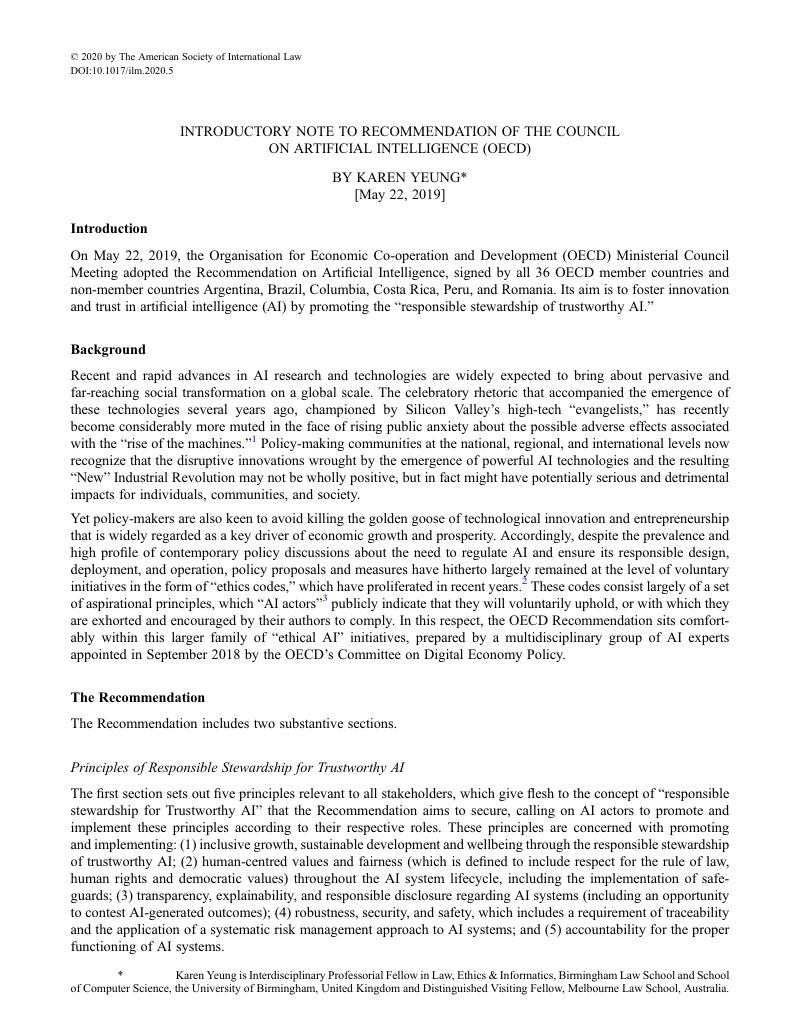Crossref Citations
This article has been cited by the following publications. This list is generated based on data provided by
Crossref.
Fatima, Samar
Desouza, Kevin C.
and
Dawson, Gregory S.
2020.
National strategic artificial intelligence plans: A multi-dimensional analysis.
Economic Analysis and Policy,
Vol. 67,
Issue. ,
p.
178.
Maxwell, Winston
Beaudouin, Valérie
Bloch, Isabelle
Bounie, David
Clémençon, Stéphan
d'Alché-Buc, Florence
Eagan, James
Mozharovskyi, Pavlo
and
Parekh, Jayneel
2020.
Identifying the 'Right' Level of Explanation in a Given Situation.
SSRN Electronic Journal ,
Raman, Rajiv
Dasgupta, Debarati
Ramasamy, Kim
George, Ronnie
Mohan, Viswanathan
and
Ting, Daniel
2021.
Using artificial intelligence for diabetic retinopathy screening: Policy implications.
Indian Journal of Ophthalmology,
Vol. 69,
Issue. 11,
p.
2993.
Boza, Pal
and
Evgeniou, Theodoros
2021.
Implementing Ai Principles: Frameworks, Processes, and Tools.
SSRN Electronic Journal ,
Tolmeijer, Suzanne
Christen, Markus
Kandul, Serhiy
Kneer, Markus
and
Bernstein, Abraham
2022.
Capable but Amoral? Comparing AI and Human Expert Collaboration in Ethical Decision Making.
p.
1.
Raji, Inioluwa Deborah
Kumar, I. Elizabeth
Horowitz, Aaron
and
Selbst, Andrew
2022.
The Fallacy of AI Functionality.
p.
959.
Wang, Ge
Zhao, Jun
Van Kleek, Max
and
Shadbolt, Nigel
2022.
Informing Age-Appropriate AI: Examining Principles and Practices of AI for Children.
p.
1.
Ahn, Michael J.
and
Chen, Yu-Che
2022.
Digital transformation toward AI-augmented public administration: The perception of government employees and the willingness to use AI in government.
Government Information Quarterly,
Vol. 39,
Issue. 2,
p.
101664.
Romero-Yesa, Susana
Ukar-Arrien, Olatz
Bilbao-Alberdi, Galo
Sasia Santos, Pedro Manuel
Casado-Mansilla, Diego
and
Eguiluz-Moran, Andoni
2022.
Tecnoetica: Inclusion and Assessment of the Ethical Competence in Engineering Final Degree Projects.
IEEE Revista Iberoamericana de Tecnologias del Aprendizaje,
Vol. 17,
Issue. 1,
p.
41.
Rasheed, Khansa
Qayyum, Adnan
Ghaly, Mohammed
Al-Fuqaha, Ala
Razi, Adeel
and
Qadir, Junaid
2022.
Explainable, trustworthy, and ethical machine learning for healthcare: A survey.
Computers in Biology and Medicine,
Vol. 149,
Issue. ,
p.
106043.
Dyoub, Abeer
Costantini, Stefania
and
Lisi, Francesca Alessandra
2022.
Learning Domain Ethical Principles from Interactions with Users.
Digital Society,
Vol. 1,
Issue. 3,
Arrien, Olatz Ukar
Alberdi, Galo Bilbao
Sasia Santos, Pedro Manuel
Lopez, Iker Pastor
Mansilla, Diego Casado
Urquijo, Borja Sanz
and
Moran, Andoni Eguiluz
2022.
Fostering ethical reflections on the impact of Information Communication Technologies in a university class.
p.
1.
Wang, Ge
Zhao, Jun
Van Kleek, Max
and
Shadbolt, Nigel
2022.
'Don't make assumptions about me!': Understanding Children's Perception of Datafication Online.
Proceedings of the ACM on Human-Computer Interaction,
Vol. 6,
Issue. CSCW2,
p.
1.
Townsend, Beverley
Paterson, Colin
Arvind, T. T.
Nemirovsky, Gabriel
Calinescu, Radu
Cavalcanti, Ana
Habli, Ibrahim
and
Thomas, Alan
2022.
From Pluralistic Normative Principles to Autonomous-Agent Rules.
Minds and Machines,
Vol. 32,
Issue. 4,
p.
683.
Mezgár, István
and
Váncza, József
2022.
From ethics to standards – A path via responsible AI to cyber-physical production systems.
Annual Reviews in Control,
Vol. 53,
Issue. ,
p.
391.
Spalević, Žaklina
Kaljević, Jelena
Vučetić, Slaviša
and
Milić, Petar
2023.
Enhancing Legally-Based E-Government Services in Education Through Artificial Intelligence.
International Journal of Cognitive Research in Science, Engineering and Education (IJCRSEE),
Vol. 11,
Issue. 3,
p.
511.
ETİKE, Şafak
2023.
YAPAY ZEKAYI İNSAN VE KAMUSAL YARAR İÇİN ÇALIŞTIRMAK: ABD VE AB POLİTİKA BELGELERİNİN ÖNERİLERİ.
Memleket Siyaset Yönetim,
Vol. 18,
Issue. 39,
p.
220.
Castellani, Aurora
Benassi, Mariagrazia
and
Balboni, Giulia
2023.
Computational Science and Its Applications – ICCSA 2023 Workshops.
Vol. 14107,
Issue. ,
p.
87.
Lukkien, Dirk R M
Nap, Henk Herman
Buimer, Hendrik P
Peine, Alexander
Boon, Wouter P C
Ket, Johannes C F
Minkman, Mirella M N
Moors, Ellen H M
and
Heyn, Patricia C
2023.
Toward Responsible Artificial Intelligence in Long-Term Care: A Scoping Review on Practical Approaches.
The Gerontologist,
Vol. 63,
Issue. 1,
p.
155.
Karunananthan, Sathya
Rahgozar, Arya
Hakimjavadi, Ramtin
Yan, Hui
Dalsania, Kunal A
Bergman, Howard
Ghose, Bishwajit
LaPlante, Jim
McCutcheon, Tess
McIsaac, Daniel I
Abbasgholizadeh Rahimi, Samira
Sourial, Nadia
Thandi, Manpreet
Wong, Sabrina T
and
Liddy, Clare
2023.
Use of Artificial Intelligence in the Identification and Management of Frailty: A Scoping Review Protocol.
BMJ Open,
Vol. 13,
Issue. 12,
p.
e076918.



